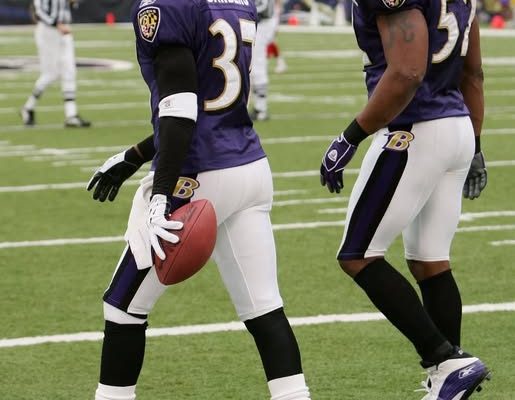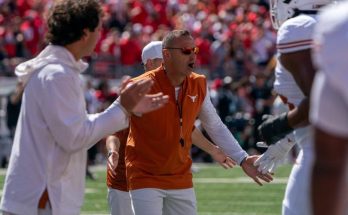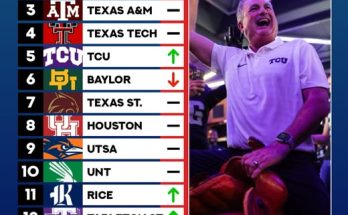In the world of professional sports, few athletes have left as indelible a mark as Deion Sanders. Known affectionately as “Prime Time,” Sanders redefined what it meant to be a two-sport superstar and a multi-position phenom. His charisma, confidence, and remarkable athleticism turned him into a cultural icon beyond the field. While most people remember Deion for his electrifying NFL and MLB careers, there’s a story from 2004 that tends to fly under the radar but remains emblematic of his unyielding competitive spirit. That year, after being retired from professional football for three years, Deion Sanders made a surprising and dramatic return to the NFL by signing with the Baltimore Ravens. At age 37, he donned jersey number 37—not just as a numerical identifier, but as a statement of intent, maturity, and personal narrative.
The decision shocked many. Sanders had stepped away from the NFL in 2001 after a stint with the Washington Redskins, having already cemented his legacy with two Super Bowl rings and numerous All-Pro selections. Most assumed he was done for good. But as Deion had proven time and time again throughout his career, he was anything but predictable. The story of his return in 2004 is one that speaks volumes about motivation, resilience, and the relentless pursuit of greatness—even when society deems an athlete past his prime.
To understand the significance of Deion Sanders’ 2004 comeback, we must first appreciate what his career had already encompassed. Sanders entered the NFL in 1989 as the fifth overall pick by the Atlanta Falcons. Immediately, he captivated fans with his lockdown cornerback play, dynamic kick returning, and a flair for showmanship that made every game feel like an event. Throughout the 1990s, he played for several teams including the Falcons, San Francisco 49ers, Dallas Cowboys, and later Washington. He won Super Bowl XXIX with the 49ers and Super Bowl XXX with the Cowboys, becoming one of the few players in history to win back-to-back titles with different teams. At his peak, he wasn’t just the best cornerback in the league—he was a game-changing force who essentially erased half the field. Quarterbacks simply didn’t throw to his side. He was also a capable wide receiver and a world-class punt returner.
Sanders’ decision to retire in 2001 came as he grew tired of the physical toll and grind of the NFL, but it was also aligned with his deepening Christian faith and desire to focus on his family and ministry. For the next three years, he was involved in broadcasting and motivational speaking. The general consensus in the sports world was that he had moved on, and with his already enshrined legacy, there was no need for him to return to the gridiron.
But Deion Sanders has always been driven by something deeper than consensus or expectation. What brought him back to the field was more than nostalgia or ego—it was purpose. By 2004, Sanders had begun to feel a divine calling to return. In numerous interviews at the time, he said he felt spiritually guided to make the comeback, in part to influence younger players and to serve as a mentor on and off the field. The Baltimore Ravens, who were already boasting one of the NFL’s most intimidating defenses led by Ray Lewis and Ed Reed, welcomed Sanders not merely for his athletic skills but for his leadership and wisdom. Head Coach Brian Billick and the Ravens’ front office saw the potential of having a veteran like Deion who could still cover and contribute, even in a limited role, while also guiding the younger defensive backs.
Physically, Deion knew the return would be no cakewalk. Coming back to professional football at 37—especially after three years away—is almost unheard of. The average NFL career lasts just over three years, and cornerback is one of the most physically demanding positions on the field. It requires speed, agility, anticipation, and quick reaction time—all qualities that tend to erode with age. But Sanders kept himself in good shape and worked tirelessly to get back into game condition. His efforts showed not only in his fitness tests but in preseason practices, where he quickly demonstrated he still had the instincts and footwork to cover NFL receivers.
When he put on the Ravens jersey for the first time, the number 37 stitched on the back was more than symbolic—it was a reminder. It was a declaration that while he may no longer have the blazing 4.2 speed that made him a legend, he brought with him a treasure trove of experience and a mental edge few could match. Number 37 represented his age, his journey, and his evolution as a man and athlete.
On the field, Sanders played a more limited role than in his prime years, often serving in nickel packages or situational coverage schemes. He wasn’t the same Prime Time who shut down Michael Irvin or Andre Rison, but he was still effective. In the 2004 season, he appeared in 16 games, starting in several of them, and recorded 3 interceptions, one of which he returned for a touchdown. His ability to read quarterbacks and break on the ball was still elite, even if his top-end speed had dipped. More importantly, his presence in the locker room was invaluable. Younger players looked up to him, sought his advice, and listened to his stories. Deion embraced the mentor role fully, blending humor, faith, and competitive fire into every interaction.
His return also contributed to a broader trend in the NFL of veteran players extending their careers through intelligence, adaptability, and elite conditioning. In many ways, Sanders paved the way for players like Charles Woodson, Champ Bailey, and later Darrelle Revis to adapt their games with age rather than exit early. His return was proof that with the right mindset and preparation, older players could still contribute meaningfully—not just in production but in building team culture.
Deion played two seasons with the Ravens, retiring for good after the 2005 season. His final NFL stat line included 53 interceptions, 22 total touchdowns, and a legacy of having changed the game at multiple positions. But that 2004 return remains a defining chapter in his life. Not because he dominated the league again, but because he showed that purpose, faith, and leadership could fuel a second act as powerful as the first.
Off the field, Sanders used his time in Baltimore to expand his platform. He continued working on his ministry, connecting with inner-city youth, and laying the groundwork for what would become Prime Prep Academy and other educational initiatives. While those ventures were not without controversy, they showed Deion’s enduring desire to make a lasting impact beyond sports. His 2004 comeback was not just about football; it was about using the game as a vehicle for a larger message.
Today, Deion Sanders is still a relevant figure in American sports. As of 2025, he has successfully transitioned into college coaching, first making headlines at Jackson State University and now continuing to build a strong program at the University of Colorado. His coaching style blends old-school toughness with modern charisma, and he remains fiercely committed to mentoring young athletes—not just in how to win games, but how to live with purpose and dignity.
That journey, however, cannot be understood without revisiting that 2004 decision to return to the NFL. In many ways, that moment encapsulated who Deion Sanders is at his core: a man unafraid to defy expectations, to listen to a higher calling, and to re-enter the arena not for applause, but for purpose. Wearing number 37 was not about style—it was about substance. It was a badge of honor, an acknowledgment of his journey, and a reminder that greatness is not limited by age but driven by intention.
So every time the anniversary of that comeback rolls around, fans and analysts alike find themselves reflecting. Not just on the stats, but on the message. Deion taught us that comebacks aren’t always about reclaiming the spotlight—they’re about finishing the story the right way. In a league that often discards players when they’re no longer in their twenties, Sanders showed that wisdom and willpower are timeless assets. And even if he wasn’t the fastest man on the field in 2004, he was still one of the most impactful.
Deion Sanders’ return to the NFL with the Baltimore Ravens at age 37 wasn’t a footnote in his career—it was a defining act of resilience and faith. He may have worn number 37 for practical reasons, but its significance extended far beyond the scoreboard. It stood for the years he had lived, the lessons he had learned, and the impact he still had to offer. For fans, it remains a compelling example of what’s possible when passion meets purpose. And for athletes everywhere, it’s a timeless reminder that greatness doesn’t retire—it just evolves.



